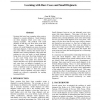Free Online Productivity Tools
i2Speak
i2Symbol
i2OCR
iTex2Img
iWeb2Print
iWeb2Shot
i2Type
iPdf2Split
iPdf2Merge
i2Bopomofo
i2Arabic
i2Style
i2Image
i2PDF
iLatex2Rtf
Sci2ools
ICML
1995
IEEE
1995
IEEE
Learning with Rare Cases and Small Disjuncts
Systems that learn from examples often create a disjunctive concept definition. Small disjuncts are those disjuncts which cover only a few training examples. The problem with small disjuncts is that they are more error prone than large disjuncts. This paper investigates the reasons why small disjuncts are more error prone than large disjuncts. It shows that when there are rare cases within a domain, then factors such as attribute noise, missing attributes, class noise and training set size can result in small disjuncts being more error prone than large disjuncts and in rare cases being more error prone than common cases. This paper also assesses the impact that these error prone small disjuncts and rare cases have on inductive learning (i.e., on error rate). One key conclusion is that when low levels of attribute noise are applied only to the training set (the ability to learn the correct concept is being evaluated), rare cases within a domain are primarily responsible for making lea...
| Added | 26 Aug 2010 |
| Updated | 26 Aug 2010 |
| Type | Conference |
| Year | 1995 |
| Where | ICML |
| Authors | Gary M. Weiss |
Comments (0)

